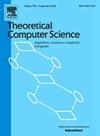Fast simulations of the multi-album collector
IF 1
4区 计算机科学
Q3 COMPUTER SCIENCE, THEORY & METHODS
引用次数: 0
Abstract
Our starting point is the coupon collector's problem (CCP). In this problem, there are n coupons that are drawn uniformly randomly with replacement. The question is how many drawings on average are needed to collect at least one copy (or some other predetermined number m of copies) of each coupon?
The problem may be traced back to the 18-th century, having been mentioned already by de Moivre. Numerous questions have been posed based on the problem since its inception, and it turned out to appear naturally in many applications.
A naive simulation of the process is trivial to implement. However, the runtime of this algorithm makes it impractical for large values of n. We present here an alternative view of the coupon collecting process, for coupons with any probabilities, that allows us to increase the range of n-s (and m-s) for which the simulation may be run. For equi-probable coupons, we present additional improvements, making the simulation possible in a very short time practically for any n. More precisely, we show that the runtime of our algorithm is .
We present theoretical results concerning some of the quantities relevant to our algorithms and conduct simulations to test the algorithms in practice.
多专辑收集器的快速模拟
我们的出发点是优惠券收集者的问题(CCP)。在这个问题中,有n张券是均匀随机抽取并替换的。问题是,平均需要多少张图纸才能收集到每张优惠券的至少一份副本(或其他预定数量的m份副本)?这个问题可以追溯到18世纪,德·莫弗已经提到过。自该问题出现以来,人们提出了许多问题,并且在许多应用中自然出现了该问题。简单地模拟这个过程是很容易实现的。然而,该算法的运行时间使得它对于较大的n值不切实际。我们在这里提出了优惠券收集过程的另一种视图,对于具有任何概率的优惠券,它允许我们增加模拟可能运行的n-s(和m-s)的范围。对于等概率券,我们提出了额外的改进,使模拟可以在很短的时间内几乎适用于任何n。更准确地说,我们表明我们的算法的运行时间是Θ(m+log ln n)。我们提出了与我们的算法相关的一些量的理论结果,并进行了模拟以在实践中测试算法。
本文章由计算机程序翻译,如有差异,请以英文原文为准。
求助全文
约1分钟内获得全文
求助全文
来源期刊

Theoretical Computer Science
工程技术-计算机:理论方法
CiteScore
2.60
自引率
18.20%
发文量
471
审稿时长
12.6 months
期刊介绍:
Theoretical Computer Science is mathematical and abstract in spirit, but it derives its motivation from practical and everyday computation. Its aim is to understand the nature of computation and, as a consequence of this understanding, provide more efficient methodologies. All papers introducing or studying mathematical, logic and formal concepts and methods are welcome, provided that their motivation is clearly drawn from the field of computing.
 求助内容:
求助内容: 应助结果提醒方式:
应助结果提醒方式:


